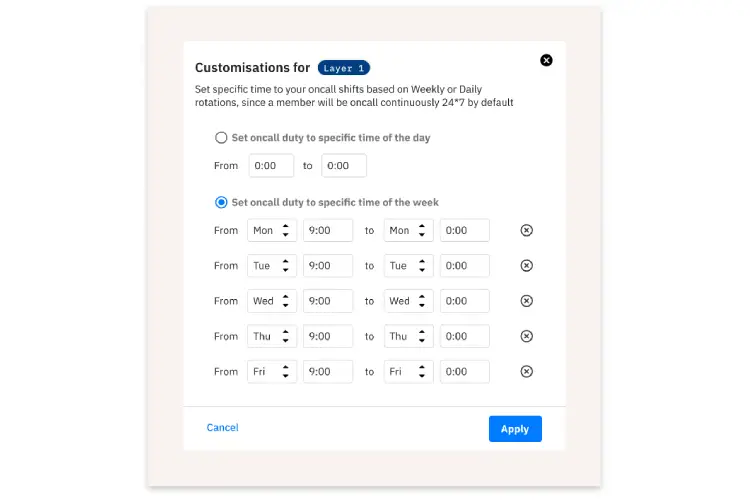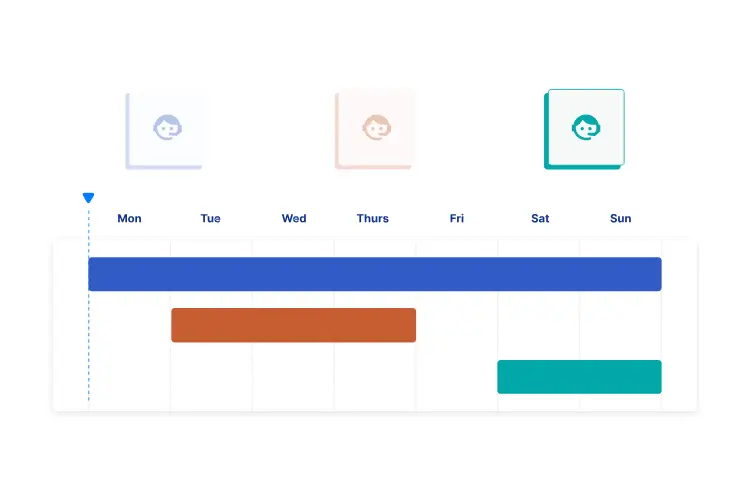Essential Strategies for Effective Oncall Rotation

Mastering oncall rotation involves more than just being available during off-hours. It requires a proactive approach to manage the associated stress and responsibilities. One crucial tip is to establish clear communication channels. Ensure that all team members know how to reach you and understand the protocols for escalating issues. Additionally, it’s essential to keep a well-organized schedule. Use tools like shared calendars and reminder apps to stay on top of your oncall duties. Equally important is the need to maintain a balance between work and personal life. Make sure to set boundaries to avoid burnout, such as designated times when you are completely off-duty. Furthermore, self-care practices like regular exercise, adequate sleep, and hobbies can help you stay resilient. Lastly, continuous learning and training are vital. Keep updating your skills and knowledge to handle emergencies effectively. By following these tips, you can not only survive but thrive during your oncall rotations.
Oncall Rotation: Balancing Work and Life
Balancing work and life during oncall rotation is a significant challenge that requires deliberate strategies. Start by setting clear boundaries between your professional and personal time. Communicate with your family and friends about your oncall schedule so they understand when you might be unavailable. It’s also crucial to use your off-call time effectively to recharge. Engage in activities that help you relax and rejuvenate, such as hobbies, exercise, or spending quality time with loved ones. Another key aspect is to seek support from your employer. Discuss the possibility of flexible working hours or additional time off to compensate for the demands of oncall duties. Utilize technology to your advantage by using apps and tools that can help streamline your work and reduce stress. Furthermore, consider setting up a comfortable and distraction-free workspace at home to handle oncall tasks efficiently. By implementing these strategies, you can create a harmonious balance between your work responsibilities and personal life, ensuring long-term well-being and job satisfaction.

Mastering Oncall Rotation:For Success
Effective oncall rotation requires a strategic approach to ensure smooth operations and minimize disruptions. One essential strategy is to develop a comprehensive oncall plan that outlines roles, responsibilities, and escalation procedures. This plan should be communicated clearly to all team members to avoid confusion during emergencies. Regular training and simulations can also enhance preparedness and response efficiency. Another important strategy is to maintain a robust knowledge base and documentation. Ensure that all relevant information, such as troubleshooting guides and contact lists, is easily accessible to the oncall team. Effective time management is also crucial. Prioritize tasks based on urgency and impact, and use scheduling tools to keep track of your oncall duties. Additionally, fostering a supportive team culture can significantly improve the oncall experience. Encourage open communication, regular feedback, and mutual support among team members. By implementing these strategies, you can enhance the effectiveness of your oncall rotation, ensuring that emergencies are handled promptly and efficiently.
Oncall Rotation: Best Practices for Seamless Shifts
Best practices for seamless oncall shifts focus on preparation, communication, and teamwork. Preparation starts with a thorough understanding of your responsibilities and the potential issues you might face. Familiarize yourself with common problems and their solutions, and keep all necessary tools and resources readily available. Clear communication is essential for a seamless oncall shift. Ensure that you have up-to-date contact information for all relevant parties and know the preferred communication channels. Regularly update your team on your availability and any changes to your schedule. Teamwork plays a critical role in managing oncall shifts effectively. Foster a collaborative environment where team members can support each other and share knowledge. Conduct regular debriefs after oncall shifts to discuss any challenges faced and lessons learned. This continuous improvement approach can help refine processes and enhance overall efficiency. By adhering to these best practices, you can ensure that your oncall shifts run smoothly, minimizing disruptions and maintaining high levels of service.
Navigating the Challenges of Oncall Rotation
Navigating the challenges of oncall rotation requires resilience and strategic problem-solving. One of the primary challenges is the disruption of personal life and sleep patterns. To mitigate this, establish a routine that allows for adequate rest before and after oncall shifts. Another challenge is the potential for burnout due to the high demands and stress of being oncall. Implement stress-management techniques such as mindfulness, exercise, and regular breaks to maintain your mental health. It’s also essential to set realistic expectations with your employer and negotiate for reasonable oncall hours and compensation. Communication is key to navigating these challenges. Keep open lines of communication with your team and supervisors to ensure that everyone is aware of your availability and any difficulties you might be facing. Additionally, seek out support networks, such as peer groups or professional counseling, to help manage the emotional toll of oncall duties. By proactively addressing these challenges, you can navigate the demands of oncall rotation more effectively and maintain your overall well-being.
Oncall Rotation: Key Tips for New Professionals
For new professionals, oncall rotation can be particularly daunting. However, with the right approach, it can also be a valuable learning experience. Start by familiarizing yourself with the protocols and procedures specific to your organization. Seek guidance from experienced colleagues and mentors who can provide insights and tips based on their own experiences. Time management is critical for new professionals. Use tools and apps to organize your schedule and set reminders for important tasks. It’s also important to communicate effectively with your team. Don’t hesitate to ask questions or seek help when needed. Building a supportive network within your team can make the oncall experience less overwhelming. Additionally, focus on developing resilience and stress-management skills. Practice self-care and maintain a healthy work-life balance to avoid burnout. Finally, view each oncall rotation as an opportunity to enhance your skills and gain valuable experience. By following these tips, new professionals can navigate their oncall duties with confidence and competence.
Optimizing Your Oncall Rotation Schedule
Optimizing your oncall rotation schedule involves strategic planning and efficient time management. Start by analyzing your workload and identifying peak times when you are most likely to be needed. Use this information to create a schedule that minimizes conflicts and ensures adequate coverage during critical periods. Leverage technology to streamline scheduling. There are various apps and software solutions available that can automate the scheduling process and provide real-time updates. Another important aspect is to ensure fair distribution of oncall duties among team members. Rotate shifts equitably to prevent burnout and ensure that everyone gets adequate rest. It’s also essential to build flexibility into your schedule. Unexpected emergencies can arise, so having backup plans and contingency measures in place is crucial. Regularly review and adjust your schedule based on feedback and changing needs. By optimizing your oncall rotation schedule, you can improve efficiency, reduce stress, and ensure that you are always prepared to respond to emergencies effectively.
Oncall Rotation: How to Stay Productive and Healthy?
Staying productive and healthy during oncall rotation requires a proactive approach to self-care and time management. Start by prioritizing your well-being. Ensure that you get enough sleep, eat nutritious meals, and engage in regular physical activity. These habits can help you maintain your energy levels and stay focused during oncall shifts. Time management is also key to staying productive. Use scheduling tools to organize your tasks and set priorities. Break down larger tasks into manageable chunks and allocate specific times for each activity. This can help you stay on track and avoid feeling overwhelmed. Additionally, create a conducive work environment that minimizes distractions and promotes concentration. It’s also important to take regular breaks to rest and recharge. Use these breaks to stretch, take a walk, or engage in a relaxing activity. Finally, stay connected with your support network. Communicate regularly with your team and seek help when needed. By following these tips, you can stay productive and healthy during oncall rotation, ensuring that you are always ready to respond to emergencies.
Conclusion
Oncall rotation is a demanding yet essential aspect of many professions. By mastering the necessary skills and strategies, professionals can navigate the challenges of oncall duties effectively. Clear communication, strategic planning, and self-care are crucial components of successful oncall rotation. Whether you are a new professional or an experienced one, implementing these best practices can help you balance work and life, optimize your schedule, and stay productive and healthy. Ultimately, the goal is to provide excellent service while maintaining your well-being and job satisfaction. By following the guidelines outlined in this comprehensive guide, you can excel in your oncall rotation responsibilities and achieve a harmonious balance between your professional and personal life.






